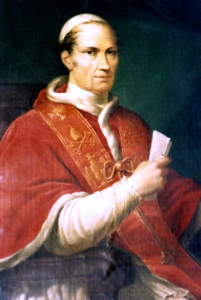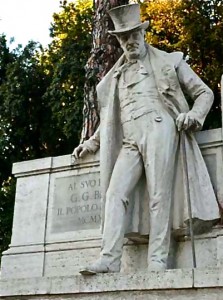POETRY IN TRANSLATION (CCXXXIX): Giuseppe Gioacchino BELLI, (1791 – 1863), Italian Poet of Trastevere Dialect, “Er mortorio de Leone Duodescimosiconno”, “The Funeral of Pope Leo XII”, “Papa Ludovic XII”
Giuseppe Gioacchino BELLI, (1791 – 1863),
Er mortorio de Leone Duodescimosiconno
Jerzera er Papa morto c’è ppassato
propi’avanti, ar cantone de Pasquino.
Tritticanno la testa sur cuscino
pareva un angeletto appennicato.
Vienivano le tromme cor zordino,
poi li tammurri a tammurro scordato:
poi le mule cor letto a bbardacchino
e le chiave e ’r trerregno der papato.
Preti, frati, cannoni de strapazzo,
palafreggneri co le torce accese,
eppoi ste guardie nobbile der cazzo.
Cominciorno a intoccà ttutte le cchiese
appena uscito er morto da palazzo.
Che gran belle funzione a sto paese!
Source: http://www.almaclassics.com/excerpts/bellisonnets.pdf
Giuseppe Gioacchino BELLI, (1791 – 1863),
Trastevere dialect Poet
The Funeral of Pope Leo XII
Last night the late great Pope went cruising by
Pasquino’s corner, right in front of us,
head nodding on a bed of fluffiness
just like an angel kipping on the sly;
and then the muted buglers came on down,
and drummers drumming with a muffled din,
and mules to haul the mighty baldaquin,
and then the papal keys and papal crown;
friars and priests, and next a clapped-out gun,
and grooms who held aloft their flaming tapers,
and then those bloody guardsmen on display.
The bells of all the churches tolled as one
the moment that the corpse went on its way…
This country has such entertaining capers
Source: http://www.almaclassics.com/excerpts/bellisonnets.pdf
Giuseppe Gioacchino BELLI, (1791 – 1863),
Poet Trasteverin
Papa Ludovic XII
Aseară, Papa Ludovic plecat-a,
într-un cosciug, pornind pe cal-eternă,
un corp lungit pe aşternut de pernă,
părând un înger aţipind agale,
în cântec de trompete şi de tobe,
marcând un ritm domol, de imn funebru,
purtat, fiind, de cardinali în robe,
în straie amintind de Sfântul Petru.
Popi şi călugari, lâng-un tun vetust,
şi halebardieri în coif de-aramă,
păşesc, într-un costum de mare gală…
iar clopotele sună-n campanile,
marcând accentul marşului funebru:
Italia iubeşte-un pic de dramă!
Rendered in Romanian by Constantin ROMAN
© 2013, Copyright Constantin ROMAN, London
The most striking characteristics of Belli’s sonnets are the overwhelming humour and the sharp, relentless capability of satirization of both common life and the clerical world that oppressed it. Some of the sonnets, moreover, show a decided degree of eroticism. Although replete with denunciations of the corruption of the world of the Roman Church, and of the 19th century Rome in general, Belli’s poems has been defined as “never impious”. His verse is frequently obscene, reflecting the exuberant vulgarity and acerbic intuitions of the local world whose language he employed, but is always phrased with an acute technical mastery of rhythm within the difficult formal structures of the Petrarchan sonnet, and by a sense of realism which was rarely matched in the poetical production of Europe, until the emergence of raw realism with Émile Zola and James Joyce.
A selection of Belli’s sonnets were translated into English by Anthony Burgess, who employed a rough slang tinged with Lancastrian as a stand-in for Belli’s Roman dialect. These translations appear in the novel ABBA ABBA, which deals with a fictional encounter between Belli and John Keats. Belli’s works have also been translated by the poet Harold Norse.
Among other English translators of Belli’s work are Peter Nicholas Dale, William Carlos Williams, and Eleonore Clark.




No Comments so far ↓
Like gas stations in rural Texas after 10 pm, comments are closed.